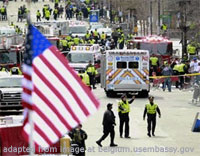After Boston, Putin Faces Questions About U.S. Visas on Call-In Show

(Moscow Times – themoscowtimes.com – April 22, 2013) Russians want to ask President Vladimir Putin on his televised call-in show this week about whether they will face U.S. visa restrictions after the Boston bombing attacks and why he is cracking down on his critics.
Those are among the 28 most frequently asked questions that have been submitted by telephone and e-mail ahead of the call-in show on Thursday, according to the website for the show.
The nature of the questions, which are pre-screened and pre-selected, suggest that this year’s annual show this might contain more bite than previous shows, which were carefully orchestrated.
A burning question for Russians is whether U.S. visas might be restricted in view of the fact that two ethnic Chechen brothers have been implicated in the April 15 bombings at the Boston Marathon that killed three people and injured more than 180.
The bombing suspects had lived in the U.S. for about decade, and one of them had received U.S. citizenship last fall.
The U.S. has not said what impact the bombings might have on its visa policy.
But Putin has made visa-free travel with the U.S. and European countries a priority of his time in office.
After two years of negotiations, the U.S. and Russia eased visa rules last fall to allow tourists, businesspeople and others to receive three-year, multi-entry visas. The new rules are the most liberal that Russia has with any Western nation and the envy of many countries.
Among the other questions that Russians want to raise to Putin on Thursday are their concerns about the prosecution of dissent, asking about the reason for jailing the Pussy Riot musicians and participants of an anti-government protest on Bolotnaya Ploshad last May, and condemning “shameful trials” against late Hermitage lawyer Sergei Magnitsky and political opposition leader Alexei Navalny.
People also are asking how to make street protests effective and for the names of nongovernmental organizations accused by Putin of being financed from abroad.
In addition, Russians are displeased with the lack of independent courts and the failure of authorities to arrest former Defense Minister Anatoly Serdyukov and his aide Yevgenia Vasilyeva in an ongoing embezzlement investigation.
Other issues that worry Russians are bad roads; the growing gap between the rich and the poor, and whether this might lead to a “social explosion”; the “impossibility” for university graduates to find a job consistent with their education; small salaries and social allowances; the commercialization of education; the absence of support for small business; rising utility costs; and illegal migrants.
This year, the Kremlin has changed the way that citizens are chosen to pose questions on air. Instead of taking whoever is present in a factory or on the street, the questioners will be divided by occupation, such as cultural figures, researchers, war veterans and students, Putin’s spokesman Dmitry Peskov told Rossia 24 television on Monday.
Three national TV channels Channel One, Rossia 1 and Rossia 24 as well as the radio stations Mayak, Vesti FM and Radio Rossiya radio will offer a live broadcast of the show, which starts at noon.
The call-in shows have lasted three to four hours in the past.
